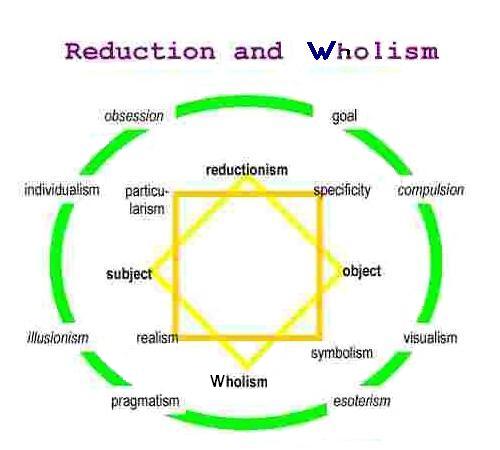Wholism and Reduction
We based this form on cognitive attitude and behavioral ones. Central octogon frames cognitive attitudes with 4 first set of key-words: the subject (supposed complex) and the object, be it the model or the cognitive representation we have of the subject. Make a difference suggests that we care that a gap can exist and makes our problem of trust about the object (scientific doubt). This pair is crossed with the sort of 'appraisal" we have on the review of one another concept. Be here reductive or wholist perspectives. A second set of key-words expresses the defectd or main problem of 'positionned' influence on the combination of 2 of previous set of key-words. Think that the picture is topologic significant (even if not always and standardized (not exactly weighted). Read for example that reductionism and object points at the question of specificity.

On the outer circle which has probably been obtained deriving 2 values of nearby inner ones. For example 'esoterism' and 'visualism' detail 'symbolism'. The detail is shaped so as to provide a positive value and negative value but in relative terms, what makes as mental image like a hook or anchor. 'Esoterism', under some begnin conditions may not be so negative, like an efficient cultural belief. 'Visualism' would be somehow negative if obtained like with psilocibic mushrooms (unless this is also a cultural practice for a wise anthropological effect (see the social importance of the chaman).
Finally if you follow the outer circle obtained repeating a similar pattern (and not using the same terms) you may feel like oscillating between positive and negative key-words (wholistically travelling) that, here, look like both epistemologic: goal, pragmatism and almost psychiatrical: obsession, compulsion. The smart philosopher will observe that there are no specific definitions provided, so he/she may think that she/he should find some in a convenient dictionnary. He/she will notice that the frame is open to some contextual meanings. Think that the frame is an open thinking system: a flexible one and take the frame for a tool more rather than a thesis.
Of course the leader of "serious decision" may not find funny the proximity of goal and (psychiatric) compulsion. Or the psychiatrist beginner may think that compulsion and obsession are practically often confused, if he/she does not care that the frame suggests a difference. Be it for example the compulsion the motor act and obsession de judged representation of something. Just observed that, paves the way to another register of questions.